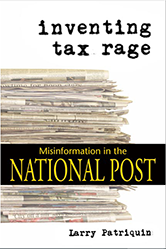Black Point, NS: Fernwood, 2004. 190 pp.

During the National Post’s first year of publication, it maintained that Canada’s supposedly exorbitant taxes were causing great damage to the economy and had produced a form of “tax rage” amongst the middle class. In contrast, this book suggests that the paper’s writers were engaged in a dubious form of “reasoning” in order to promote an ideology that mostly benefits the wealthy.
In advancing its case, the Post published a stunning collection of errors that were incessantly repeated in editorials and columns. Yet in 2000, the federal Liberal government surrendered completely to the bogus “tax rage” invented by the Post and, as a result, its fiscal policy became inseparable from that of right-wing parties. This book categorizes these errors to better illustrate why the Post’s claims were flawed. The chapters are structured in a point-counterpoint format to serve as a guide for readers on how to, and how not to, develop and defend arguments.

an insightful book … [Patriquin has] painstakingly demonstrated the factual and logical errors that columnists in the National Post routinely made in the late 1990s in their never-ending calls for tax cuts, particularly for the rich, and for the gutting of government programs.
Neil Brooks
Behind the Numbers (CCPA)

Like the Post, Patriquin’s book is lively and readable. Unlike the Post, it is full of sharp, insightful analysis and seeks to enhance, not limit, our democracy.
Linda McQuaig
journalist and author of All You Can Eat: Greed, Lust, and the New Capitalism

This excellent dissection of the role of ideology and the media in the great tax debate of the late 1990s deserves to be read by anybody who wants to understand how economic and social policy is really shaped in our supposedly democratic society.
Andrew Jackson
Senior Policy Advisor at the Broadbent Institute and former
Chief Economist at the Canadian Labour Congress